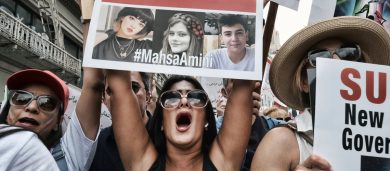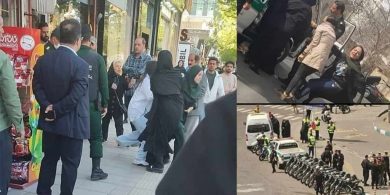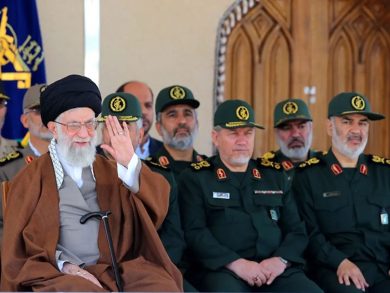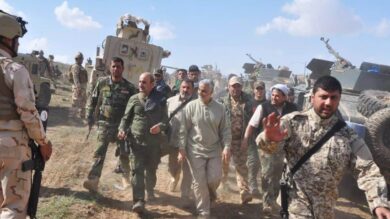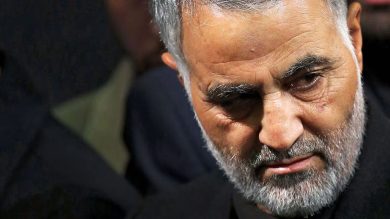The Islamic Revolutionary Guard Corps (IRGC), the powerful military and ideological arm of Iran’s government, has long played a key role in enforcing the regime’s repressive policies, particularly against women. Since the Islamic Revolution in 1979, women in Iran have faced systemic discrimination under laws that limit their freedoms, rights, and opportunities. The IRGC, tasked with safeguarding the regime and its principles, has been instrumental in enforcing these policies, often through violent crackdowns, censorship, and intimidation.
Despite these challenges, Iranian women have emerged as powerful symbols of resistance, standing against the IRGC’s oppressive tactics and fighting for freedom, equality, and justice. This article highlights the stories of women who have defied the IRGC’s repression, examines the mechanisms used to suppress them, and celebrates their unwavering courage and empowerment in the face of adversity.
The Role of the IRGC in Women’s Oppression
The IRGC plays a central role in enforcing the regime’s strict interpretation of Islamic law, which disproportionately affects women. Through its Basij paramilitary forces and morality police, the IRGC monitors and punishes women who violate dress codes or participate in activities deemed “un-Islamic.” These restrictions extend beyond dress to every aspect of women’s lives, including employment, education, and public behavior.
1. Enforcing Dress Codes
The mandatory hijab, a cornerstone of the regime’s ideology, is heavily policed by the IRGC. Women who fail to comply with dress codes face harassment, fines, arrest, and even imprisonment. The IRGC’s morality police are notorious for violently detaining women in public, often under the pretext of “immodesty.”
2. Suppressing Protests
Women have been at the forefront of protests in Iran, demanding basic rights and freedoms. The IRGC has responded with brutal crackdowns, using violence, mass arrests, and intimidation to suppress dissent. High-profile protests, such as those following the death of Mahsa Amini in 2022, highlight the IRGC’s role in targeting women-led movements.
3. Silencing Activists
The IRGC systematically detains and imprisons women’s rights activists, journalists, and lawyers who challenge the regime. Many are subjected to inhumane treatment, torture, and lengthy prison sentences. This strategy aims to silence women’s voices and deter others from joining the resistance.
Stories of Resistance
Despite the IRGC’s oppressive tactics, Iranian women have consistently demonstrated remarkable resilience and courage. Their stories of defiance inspire others and expose the IRGC’s brutal methods to the world.
1. Mahsa Amini: A Catalyst for Change
Mahsa Amini, a 22-year-old woman, became a global symbol of resistance after her death in IRGC custody in 2022. Arrested for allegedly violating the hijab law, Mahsa’s tragic death sparked widespread protests, led predominantly by women. Her story galvanized a movement demanding accountability from the IRGC and systemic change in Iran.
2. Nasrin Sotoudeh: A Voice for Justice
Nasrin Sotoudeh, a prominent human rights lawyer, has defended countless women arrested for protesting Iran’s mandatory hijab laws. Despite facing imprisonment and harsh treatment by the IRGC, she continues to advocate for women’s rights and democracy, becoming a beacon of hope for many.
3. Narges Mohammadi: Fighting from Prison
Narges Mohammadi, a renowned activist and journalist, has spent years in IRGC-run prisons for her activism. Even behind bars, she has led hunger strikes and written extensively about the regime’s human rights abuses, exposing the IRGC’s brutal tactics to the international community.
4. Girls of Revolution Street
In 2017, a woman stood on a utility box in Tehran, waving her hijab on a stick in protest against the mandatory dress code. This act of defiance sparked the “Girls of Revolution Street” movement, inspiring women across Iran to challenge the IRGC’s authority publicly.
Empowerment Through Resistance
Women in Iran have not only resisted the IRGC’s oppression but have also found ways to empower themselves and others. Their resilience has fostered a growing movement for change, both within Iran and globally.
1. Building Solidarity
Women in Iran have created networks of support to sustain their resistance. Whether through underground groups, online campaigns, or protests, they share resources, amplify each other’s voices, and foster solidarity. These efforts have made it increasingly difficult for the IRGC to silence dissent entirely.
2. Leveraging Technology
Social media has become a powerful tool for Iranian women to document and share the IRGC’s abuses with the world. Platforms like Instagram, Twitter, and Telegram have amplified their voices, garnering international attention and support for their cause.
3. Inspiring Global Movements
The bravery of Iranian women has inspired movements worldwide, sparking demonstrations in solidarity and calls for international action against the IRGC. Their struggle resonates globally, highlighting the universal fight for women’s rights and equality.
The IRGC’s Growing Backlash
The IRGC’s repressive tactics have not gone unchallenged. International organizations, governments, and activists have condemned the IRGC’s human rights abuses, imposing sanctions and advocating for its designation as a terrorist organization. These efforts aim to weaken the IRGC’s power and support Iranian women’s fight for freedom.
1. Sanctions and Designations
Countries like the United States and the European Union have imposed sanctions on the IRGC and its leadership, targeting their financial networks and limiting their ability to operate globally. Designating the IRGC as a terrorist organization has further isolated it on the international stage.
2. Advocacy and Awareness
Human rights organizations, including Amnesty International and Human Rights Watch, have documented and publicized the IRGC’s abuses against women. These efforts have mobilized global support for Iranian women and increased pressure on the regime.
3. Grassroots Campaigns
Grassroots campaigns, such as #FreeIran and #WomanLifeFreedom, have amplified the voices of Iranian women, keeping their struggle in the global spotlight. These movements play a crucial role in sustaining international attention and support.
The Future of Resistance
The struggle of Iranian women against the IRGC is far from over. While the IRGC continues to wield significant power, the growing resistance led by women offers hope for a brighter future. By standing together, leveraging technology, and drawing global attention to their cause, Iranian women are challenging the IRGC’s oppressive grip and paving the way for change.
Conclusion
The stories of women standing up to the IRGC exemplify resilience, courage, and the unyielding pursuit of freedom. Despite facing relentless oppression, Iranian women have emerged as powerful agents of change, inspiring movements within and beyond their borders. Their resistance highlights the IRGC’s role as a force of repression and underscores the urgent need for global solidarity in their fight for justice, equality, and human rights. By supporting these women and holding the IRGC accountable, the international community can help empower a generation determined to break free from oppression and create a future of hope and liberation.
Join Our Newsletter!
Stay informed with the latest updates, news, and ways to take action in the fight for justice and global security. Sign up now to get updates delivered straight to your inbox!

